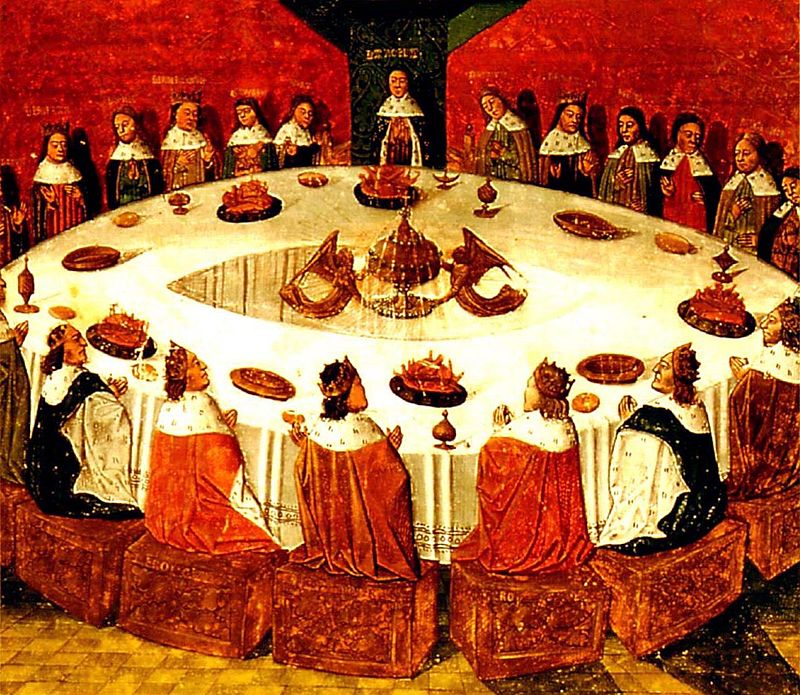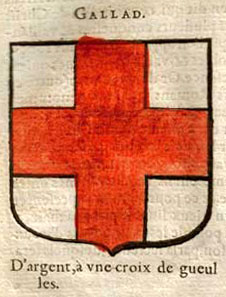My current Audible listen is Le Morte d'Arthur by Thomas Malory. It's the earliest complete telling of the King Arthur legend in the English language. Written near the end of the Hundred Years War (just in time for the Wars of the Roses! Oh, those whacky Norman monarchs!), Malory, of whom there is little known, renders the tale of the legendary king as a treatise on the Chivalric Code. It's also a transitional time for the English language. Gone is the bizarre Anglo-Saxon tongue of Beowulf. By now, poet and royal in-law Geoffrey Chaucer has normalized writing literature in English. (The Normans, originally Vikings who became French, considered Anglo-Saxon a degenerate tongue in their early days. Henry IV decided an English court should speak English. I know. Radical.) But Malory's Middle English looks like Shakespeare trying to forge new entries into The Canterbury Tales. However, after the most recent reading of a Knight of the Round Table going out and doing feats of daring-do, I can only hear one phrase as I start a new section.
LET'S GET READY TO RUMBLE!
 |
| Sony |
Strange, isn't it? That sounds like something more out of the movie A Knight's Tale (with Chaucer as a character and a 90s rock soundtrack) than a Norman coopting of a Saxon forgery of a Welsh legend originally based on the life of a warrior from the waning days of Rome. Malory tells a familiar tale of Uther Pendragon taking an enemy's wife, Igraine, and conceiving Arthur, who is raised in secret, pulls Excalibur from a stone, then conquers all Britain and Ireland before marching down to Rome to give the Emperor Lucius what-for. (Historians will note that was actually the Vandals and the Visigoths, not Graham Chapman and the Monty Python troupe.) And then we get into the Knights of the Table Round, of which Malory says there are about 150. And each one goes out to fight whomever they will fight. Sometimes, they run afoul of Arthur's incestuous sister, Morgan Le Fay, and fight each other. In listening, I noticed knights will be the hero in one book, the villain in another, and sidekick in yet another. Doesn't that sound like WWE?
Le Morte d'Arthur is episodic and tends to repeat itself. It's not the post-World War II spiking of the ball for England like TH White's The Once and Future King (and by extension, the musical Camelot), which followed more modern storytelling. Nor is it the more complex, feminist reworking that is Marion Zimmer Bradley's The Mists of Avalon, which has more in common with Dune than Malory, aside from the characters. No, these tales were not meant to be a single novel or play like Shakespeare in his day or even today's ten-episode streamers. Nor was it intended for the elite few who could read. Like Homer before him, Malory and Chaucer wrote for their stories to be read piece by piece to the masses, who didn't really care about which god slept with which goddess or... Well... Let's just say Greek and Roman mythology is less complicated than Phonecian. (Moloch? Seriously?) No, the masses gravitate toward action. Fight scenes. Heroes with a code. Damsels in distress. (Though these days, the damsels often come armed with brains or weapons or both and usually cause or relieve distress more often than be in it.) They want adventure.
Heroes and villains. Like pro wrestling. And the heroes swap places. One chapter Sir Tristram is the boldest knight, save Lancelot. The next, he's dumped his damsel for another and off living like a Duke in Brittany, earning several knights' enmity. But wait. A rival to Arthur has kidnapped or killed one of the knights of the Round Table. Or Morgan Le Fay (who also switches sides a lot) has hexed one of our heroes. Another knight comes in to save the day, but he needs help. "Oh, um, Trist? Why don't we settle this with a joust a Pentecost. I could really use a hand right now."
Even Lancelot becomes the villain eventually. Many of the knights lust after Queen Guinevere. Lance actually does something about it. It's the precursor to pro wrestling. Andre the Giant is the good guy. Then he's not when he battles Hulk Hogan. Roddy Piper is a heel. Then he's the wise old man of wrestling. (Also, a guy with really cool sunglasses that expose capitalism's faults. I'd have thought $200 for a non-prescription pair of Oakleys was a hint, but that's a couple of other columns.)
Malory, I've come to realize, was a pulp writer. So was, to some extent, Shakespeare, but he wrote long, (usually coherent) plays. (And someone should have let him completely rewrite Edward III. Is it really his canon if he's the obvious script doctor on a polished turd? I digress.)
Even Dickens and Twain wrote this way early on. The Pickwick Papers aren't so much a novel as a serialized forerunner to Freaks and Geeks minus the MST3K cameos. Even Tom Sawyer and Huckleberry Finn, two of the most influential American novels ever written, read like a newspaper serial or, to our modern eyes, a streaming program. But unlike Dickens and Twain, who spent a fair bit of time fleshing out even their most one-dimensional characters, Malory has simple good guys and bad guys who are interchangeable. It was Twain, White, Bradley, and a host of movie directors and novelists who gave the various knights deeper motivations. Read The Mists of Avalon, and you wonder why Merlin didn't get smacked around by an angry Morgan Le Fay.
Malory picked up where Chaucer left off in terms of language, bridging the gap between the nascent Middle English of the Plantagenet Era and Elizabethan style we see in Shakespeare and the King James Bible. But Chaucer was writing a cross-section of English society that would inspire later classics, including Dan Simmons's classic Hyperion. Malory wants you to throw some popcorn in the microwave (or it's 15th century equivalent, in a pan over an open fire.) Or maybe, since Arthur was pilfered from the Welsh, stick the Orville Redenbacher in the popty ping. (Which remains my favorite Welsh slang of all time.)
And besides, if it weren't for Lance, Gawain, and Gallahad, we'd have never had Holmes, Phillip Marlowe, or Jim Rockford.
Or WWE Raw.






